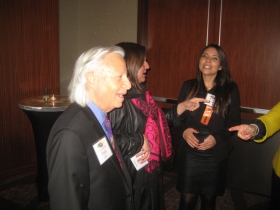Davis Sets, Cancels Meeting on Streetcar
His claim on streetcar turns out to be false. Meanwhile, new city assessor appointed with little fanfare.
His claim on streetcar turns out to be false. Meanwhile, new city assessor appointed with little fanfare. Back to the full article.


























Wangard is developing the Water and Brady project, aren’t they?
@Jerad Yes Wangard. I’ve made the correction.
I know it’s a dead horse at this point but I think BRT actually *would* be a better use of money and I bet if people wanted to get creative with the definition of “rail” it would be plausible.
So your good at wasting $950 million to get $54 million, and that’s just to build something that will be under used
Be honest Paul. You’re going to ride the choo-choo.
Getting a little ahead of YOURself, aren’t you Paul?
PMD, Hopefully none of us will get a chance to ride it
Dave, the best way to tell when someone can’t argue the facts is when they go after a common misspelling.
Paul, keep dreaming. And worry not, no one is going to take away your car.
At this point, is there really any reason to oppose the streetcar? Even if it’s not the most exciting thing ever, the money is clearly just for rail use, so why not try it?
TF, The “free” money isn’t the point, it’s all the city of Milwaukee tax dollars that will be diverted from roads and schools and other things. We’re talking $950 million more just to build it then add in maintenance and operating costs.
TF, also if the Mayor and the Country Executive got together they could petition to have that money redirected to other new mass transit ideas such as L.P. powered buses.
We’re talking $950 million more just to build it? So over $1 billion total to build it? That’s a new one to me. Can you share a link to your source for this information? KThanks.
To be very clear, the only way today to reallocate the federal funding for the streetcar is with an act of Congress (and the President to sign the new law, and so on), which is not likely.
@Dave Reid: Exactly. And, even if there were some loophole that would permit reallocation, it doesn’t seem worth it. I fail to see what the streetcar can hurt. If anything, it seems that it would encourage foot traffic throughout the year, making it easier for downtown/Third Ward/east side people to get around without cars. A net positive result.
Ralph, take a look at all the planned extendsions, then add cost per mile to build.
TF, we don’t have the money to throw away, that’s the harm it will do. If someone gave you $10,000 towards a lake home up north but you would have to pay the other $190,000 and the costs to furnish and maintain it, would you take the deal? Then figure in taxes and knowing you would only use it three days a year. The only difference is you could always sell the home.
@TF Agreed.
I would totally take that lake home deal. I’d love a lake house, and $10,000 would help make it happen.
That deal sounds an awful lot like the housing stimulus during the recession. I missed out, but I had friends and relatives who took advantage. I have no doubt that you’d have plenty of takers, and it would help struggling property owners sell. You could do a lot of good with that offer.
If we’re making odd analogies, it wouldn’t be 10k out of 190k it would be 100k out of 200k or 50%, plus a year and a half of having your utilities paid. You could live in that new home year round. That new home would be 100% ADA friendly, in fact much more so than the older homes on the block with steps. You’d know that by buying this house you would be helping to improve the neighborhood and that neighboring property values would go up. And although you might want a bigger house, you’ll look into an addition in the future.
Either you’re all idiots or ….forget it you’re all idiots. The problem is I have to pay for your stupidity
Kyle, you have friends that took that first time home buyers credit?? I don’t believe you. You don’t seem like the type that would have friends who would do that. Your friends are moochers of the system and wasted taxpayer money on their purchase.
@Paul… And that’s how you win an argument folks! Case closed. Paul wins. Now please get back to finalizing your NCAA tourney pool bracket. Time is running out.
Yeah! Everyone one of you who supports a vibrant, attractive, livable city core are complete idiots! I’m sure if we give in on this whole streetcar thing you’ll start wanting things like walkable neighborhoods, good schools, and upkeep on parks! Fools all of you!
PMD, bracket was turned in last night after the final play in game
AG,and this is why we should all be against taking tax money from schools, parks and crime fighting to pay for a streetcar that will just be a drain on the city. A fraction of the costs of this project could make the bus system the best in the country and something people could actually use to get to jobs.
I don’t get how someone can be so certain that the streetcar will be a failure while also being certain that with just a little money Milwaukee could have the very best bus system in the nation. If it’s that simple, why doesn’t Milwaukee already have the best bus system in the nation?
PMD, these new streetcars have been a failure in every city so far, and I said a fraction of the money not just a little money. I’m sure you can find some stories about how great they are, but dig a little deeper into cost overruns, traffic problems, bike crashes and much lower than expected ridership. The flexibility of buses to change routes around construction or other obstacles makes them a far better choice.
I don’t think it’s true that they’ve been a failure in every city so far. Opponents keep saying that, but I don’t think it’s accurate. Buses have their place, no doubt, but why can’t Milwaukee have bus and streetcar systems that complement one another? Plenty of cities have a bus system in addition to a subway or streetcar or light rail. Why should Milwaukee be bus-only? Suddenly everyone loves the bus system but that has not always been the case.
Paul (post 16), the per-mile cost drops as the system is extended. The first phase includes a lot of one-time costs (a maintenance and car-wash facility, back-up AC-to-DC power converters, and a spare $4.4 million vehicle). Those costs will be absent in expansion phases.
Also, utility relocation costs diminish as the lines extend beyond downtown because electric, phone, and cable TV lines are more likely above ground and since there are no steam lines (the biggest single utility relocation cost) outside downtown.
Paul (post 27). You say “A fraction of the costs of this project could make the bus system the best in the country…”
Under federal law, transit systems must maintain two distinctly different budgets: capital and operations. This is because Republicans, during the Reagan years, decreed that federal dollars never subsidize local transit operations. It is now illegal to let any capital money (like the $54.9 million being used for the streetcar) find its way into the operating budget.
There is one small exception today–the feds sometimes subsidize the first 3 years of new operations; but beyond the first 3 years, no federal dollars can ever be used for operations. The streetcar is using this exception for its first 18 months (and hopes to get a single 18-month extension). MCTS is using this exception to fund its color-coded “express” buses (by claiming–wrongly, I believe–they are new operations). When these federal funds run out in under 3 years, MCTS will be in deep trouble and will be unable to operate its current system, much less take on any expansion.
Again, this $54.9 million can NEVER be used for operations, even if Congress passed a law removing the “fixed rail” requirement.
The streetcar’s operating subsidy (around $2 million annually) could be used for MCTS operating subsidies, except for one problem: MCTS is a COUNTY operation spending COUNTY money and Streetcar is a CITY operation spending CITY money.
If would be unfair to expect CITY taxpayers to unilaterally start funding a COUNTY-controlled program without requiring richer cities (like River Hills, Wauwatosa, etc) to make similar contributions.
Tom, two things 1 Don’t you also think the operating costs of the streetcar will also be in deep trouble once the federal funds run out. 2 If you say this city money should not be used for a county service would it also be unfair if any county money is used for building or operating the city streetcar?
Paul, unless you contort the Fed grant into “county money” there is no money from the county going to this city project.
AG, I’m talking when the Mayor runs out of federal grant money to run it and then turns it over to Milwaukee County Transit.
Paul, between the cost of extensions, the ridership numbers, the idea that it would be handed over to the county, the idea that tax money will be taken from schools and police, that the money could be spent on buses, that the county would even want to use more money for the bus system, and whoever you picked to win your bracket… you’ve really made a lot of assumptions here.
At what point do you step back and think to yourself that maybe you’re stretching things just a bit? Maybe this isn’t the death knell for the city that you think it is. Heck, maybe even start looking at the positives too? Nah, that’s probably asking too much…
AG, I won’t even take comfort in saying”I told you so” when these things happen. Maybe you’ll learn to research what’s happening in every other city that took the “free” money, and what it’s actually costing them. Can’t think of one positive of a streetcar that can’t be done better than by a bus.
Do you ride the bus a lot Paul? Are you extremely familiar with the bus system here and in other cities?
Yeah seriously AG it’s time to do some research! Paul doesn’t have to provide evidence. You can just Google it.
Also, your claim that no streetcar is successful is pure nonsense. Portland and Tucson, for example, have successful streetcar systems.
http://portlandtribune.com/pt/9-news/251898-121224-portland-streetcar-ready-for-expansion-in-september-
http://tucson.com/news/business/tucson-s-streetcar-exceeds-ridership-expectations/article_a5562837-57a6-5890-8fab-eeb8ae0b219b.html
http://tucson.com/entertainment/blogs/caliente-tuned-in/streetcar-has-helped-to-redefine-tucson-s-downtown/article_2397cd6c-4ac0-5db5-8dfe-9fc6b9625595.html
PMD, it’s ok… Paul is probably upset the riverwalk never paid for itself either. I mean, ignore that it helped generate hundreds of millions of dollars in property value because the people who walk on it and moore their boats to it don’t cover the costs to build and maintain it.
Paul’s perspective is that all costs must be directly covered by the users. I’m sure he applies the same logic to busing, schools, parks, freeways, and any other government paid for amenity.
It does seem like he would be upset by that. And no doubt his logic is consistent.
@AG @PMD, you two sure are mean to people who have no idea what they are talking about. Mostly just “mean” in the sense that you point out obvious flaws.
AG, last time I checked the riverwalk didn’t cost $60 million to build and $2.5 million to run and maintain every year
Hereiam. .Name one thing I said that is wrong
Paul (post 44), you asked what you said that is wrong.
Here is one:
You said (post 27) that a fraction of the streetcar money could make the MCTS bus system “the best in the country”.
MCTS actually got lots of that streetcar money but did not become “the best in the country”.
In 2009, this Federal Milwaukee transit fund contained $91.5 million which could only be spent on projects about which the Mayor and County Executive agreed. Mayor Barrett wanted streetcars and County Executive Scott Walker wanted buses, so nothing could be spent at all.
Mayor Barrett offered to split the money 50/50 (with MCTS getting $45.75 million), but County Executive Walker refused. Then in 2009 Congress split the money 60/40 with $36.6 million going to MCTS–67% of today’s federal streetcar capital contribution—the “fraction of the costs of this project” you claimed would make MCTS “the best in the country”. County Executive Scott Walker spent that money on bus service and despite that spending, MCTS actually got worse.
Before Scott Walker took over, MCTS was twice named (1987 and 1999) “Outstanding Public Transportation System” by APTA, a trade group covering the US and Canada. MCTS hasn’t been so honored since.
Tom, I was talking about a fraction of the total cost of the streetcar which will be a billion dollars and that’s not even counting the costs to run and maintain
Paul, bus operations are quite expensive, so even a fraction of $1 billion doesn’t go very far. For example, $400 million would only temporarily (for less than 15 years) restore MCTS back to 2001 levels.
Compared to the end of 2013 (latest available data), MCTS would have to increase its fleet size and annual vehicle miles by about 30% to bring back 2001 service levels. This would cost $41.3 million (for 118 new buses at $350,000 each) plus additional annual operating expenses of $38.4 million (for 4.5 million additional bus miles at the actual MCTS cost of $8.52 per mile).
Even if you assume that revenue (from fares and ad sales) would also rise 30% (by $13.7 million annually), you would need an increased annual operating subsidy of $24.7 million.
In 15 years, this expansion would cost another $412 million in ADDITIONAL operating and capital subsidy, not for America’s best bus system, but just for one that existed before 2002—one still limited to Milwaukee County plus Bluemound Rd out to Brookfield Square.
Before 15 years would pass, the $400 million would be gone and so would the buses purchased with that money. Diesel buses must be replaced every 12-15 years whereas electric streetcars last 50-100 years or more.
Paul, regardless of the cost of a public amenity, there are many value add public amenities that do not pay for themselves. Whether it’s the river walk, the parks system (75 million+ budget), county sheriff, or a host of other programs, just because direct revenues do not pay for the program doesn’t mean there is not value in having it. A program or amenity directly paying for itself is a poor measure of public value.
Tom, you say the bus system would be limited to Milwaukee County so it’s bad, but a streetcar that costs more than double that is limited to the city will be better?
AG, my point exactly, the streetcar adds no public value that cannot be accomplished cheaper and much better than by buses
How do you know that for sure Paul? Have you lived in a city with a streetcar system? How are you so certain that a bus is always superior? And why can’t they effectively work together?
PMD, you do know how to research things on the internet don’t you. If there is any problems on the streets, accident, police situation, etc. the streetcar system is completely stopped while a bus system can go one block around and stay on schedule. Buses are flexible and routes can be altered for events ballgames, summerfest, concerts or conventions while streetcars are stuck on a fixed route.
Ugh the old, tired “go do your own research” argument, meaning one doesn’t have much of an argument therefore they just tell someone to go find out for themselves. If “buses can go around an accident” is the best you can do, that’s pretty pathetic. You are grasping at straws to defend your beloved bus system, which I’m sure you use on a daily basis.
There was a time when I was a daily bus rider. I was a college student and didn’t have a car so it came in handy. But it was hardly a great system. Going 5 miles from downtown to the east side took at least 30-45 minutes. It was always late. It often wasn’t very clean. Riding the bus certainly was nothing to write home about. So unless it’s changed dramatically since 2000, it’s sort of puzzling to see so many people defend it as the ideal transportation system for Milwaukee and something that must be protected from a streetcar.
PMD, and this is why you’ll never find the truth, you’re too lazy to do any research and just believe whatever the Mayor and the Journal Sentinel tells you, and years from now when it’s too late you’ll wonder what happened.
Paul, you refer to “a streetcar that costs more than double that is limited to the city”. I assume you are referring to a possible full-blown streetcar system (which may or may not ever happen). Since MCTS costs $131 million a year to operate (of which $87 million is taxpayer-paid subsidy), “a streetcar that costs more than double” would be huge and surely extend beyond the City.
Buses do indeed have some advantages over streetcars:
• They cost less up front (but have higher continuing costs).
• They are flexible (able to change routes quicker and faster than streetcars).
Streetcars have many advantages over buses:
• They attract more passengers than buses.
• They have no smelly diesel exhaust.
• They are quiet.
• They carry more people (over 100 per vehicle) than a typical 40-foot bus (50 max).
• They “ride” better. (Many people—including me and my wife—get motion-sick if we read in a bus or car; this just doesn’t happen on rails. Because of this, rail passengers can use their travel time productively.)
• They spend less time at stops and are therefore faster.
• They last longer (50-100 years vs 12-15 for buses) and require less maintenance (no exhaust, steering, or engine cooling systems, no transmission, no rubber tires to wear out, etc).
And it’s not true that “If there is any problems on the streets, accident, police situation, etc. the streetcar system is completely stopped while a bus system can go one block around and stay on schedule.”
If the streetcar tracks are blocked, only that particular part of the system is out, not the entire system. For example, if there were a blockage near the Couture, the rest of the lline (Amtrak station to Farwell and Odgen) would continue to operate.
Buses do NOT stay on schedule when they detour “one block around”. They also lose time each time they go around a UPS truck parked in their path—something a streetcar won’t have to do.
Tom, you’re right the streetcar would lose no time going around that UPS truck, because it can’t go around anything that blocks the tracks.But to keep your wife from getting sick while she rides it then I have no problem spending taxpayers money to make her happy, you’ve changed my mind . 😉
The streetcar won’t have to go around UPS trucks because people simply will not park on the tracks (because they know the streetcar cannot go around them).
Also it’s not just me (and my wife) that gets motion sick on rubber-tire vehicles; I just Googled “motion sick reading bus” and got 262,000 hits.
There is no denying that rail attracts more passenger than buses and ride quality is a big reason.
politifact.com/oregon/statements/2012/apr/03/charlie-hales/do-streetcars-really-beat-out-buses-capacity-rider/
Tom, is the motion you pick-up with your peripheral vision that gets you sick, it happens on planes and has nothing to do with rubber tires.
Sorry to disappoint but I do not believe everything the mayor and the daily paper tell me. Quite the contrary, especially in the case of the paper. You have simply failed to prove that the streetcar is destined to be a failure and is a huge mistake. You have failed to prove that the bus system is the one and only answer. Your defense consists of insanely weak statements like “a bus can go around an accident.” You don’t have a leg to stand on here.
PMD, once again a little research on your own and you will find the answers. Look up the DC streetcar and see how well that’s running.
Paul take your own advice. Do a little research on your own. Look at the successful Tucson and Portland streetcars. You might learn something.
PMD, and there’s the difference between you and I, you do a little research and stop when you find an answer to your liking, I’ll do more research and get the full story. Look at bicycle vs streetcar in Portland.
Paul, I know all about DC’s issues. One, that doesn’t prove Milwaukee’s will have problems or isn’t worth doing, and two, DC is not the only city with a streetcar, and you repeatedly claim that there are no streetcar success stories when that is blatantly false.
PMD, there is not one streetcar project that did not go over costs, that did not have multiple problems, that started carrying passengers when scheduled and has met ridership or revenue projections. I call that failure, maybe I have higher expectations than you.
Spin away Paul. You lied and you know it. There are successful streetcar systems out there. Your definition of failure needs refinement.
PMD, what’s your definition of success?